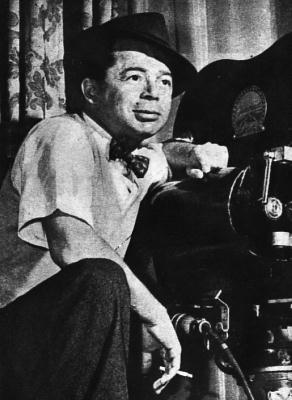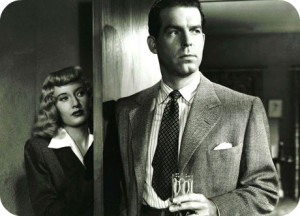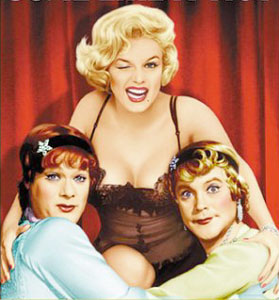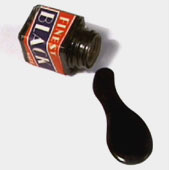 When we read about great writers’ lives all the milestones to success are clearly marked in the story: the first glimmer of talent, the years of struggle in which he or she perfected the craft, the first break, and finally success, whether it’s slow, in fits and starts or seemingly overnight. Reading all this from the outside, it’s easy to forget that what looks like a cohesive narrative may not have felt like a sure thing from the inside. It sure as hell doesn’t feel like our own careers are shaping up in any discernible way, a fact that’s discouraging. So I bring you a new feature to inspire: life lessons we can take away from famous writers’ life stories. We already have plenty of tips about the actual writing, it’s the psychological struggle where we could use some guidance. Today I start with one of my favorite filmmakers of all time, Billy Wilder.
When we read about great writers’ lives all the milestones to success are clearly marked in the story: the first glimmer of talent, the years of struggle in which he or she perfected the craft, the first break, and finally success, whether it’s slow, in fits and starts or seemingly overnight. Reading all this from the outside, it’s easy to forget that what looks like a cohesive narrative may not have felt like a sure thing from the inside. It sure as hell doesn’t feel like our own careers are shaping up in any discernible way, a fact that’s discouraging. So I bring you a new feature to inspire: life lessons we can take away from famous writers’ life stories. We already have plenty of tips about the actual writing, it’s the psychological struggle where we could use some guidance. Today I start with one of my favorite filmmakers of all time, Billy Wilder.
Wilder began his career as a reporter and then went on to try his hand as a scriptwriter in the incipient German film industry, eventually landing at the famous UFA studios in Berlin.
Just when success looks like a sure thing, you may have to start from scratch. Jewish by birth, when Hitler rose to power Wilder joined a long line of actors and filmmakers who escaped to Hollywood. (According to The Paris Review, in L.A. he roomed with Peter Lorre!) And so at 27, Wilder had to start from scratch, in a new country and a foreign tongue. Oh, and did I mention that he only knew some 300 words in English? As a writer, your command of vocabulary is your instrument. Anyone who’s learned a second language has experienced the frustration of being unable to express yourself fully, akin to a loss of identity. Imagine how much scarier it is if it’s also tied to your livelihood!
To make matters worse, he only had a temporary visa and when it expired, he had to travel to Mexico to renew it. Things looked pretty bad. He had none of the right documents and getting another visa could take years. His gift of gab saved the day when he persuaded the authorities to renew it. Due to his limited English, the studio paired him with an American writer, a practice that he adopted for the rest of his career: “Later I found that if I had a good collaborator it was very pleasant to talk to somebody and not come into an empty office.”
While few of us will have to exile ourselves, face an enemy bent on destroying us, or learn a new tongue, events like divorce, bankruptcy, or illness may disrupt our lives and force us to start from zero. Any of these experiences can be discouraging. Take a page from Billy: be creative, adaptable, and persistent in life as well as in your work.
Find the opportunity despite the setbacks. As it happened, Wilder landed in Hollywood at a time in which the studios were willing to allow scriptwriters to direct their scripts. (Writers are notoriously underappreciated in Hollywood.) As a natural-born writer, Wilder was in the right place at the right time to make the leap from scribe to director. Now, you can argue that this is a matter of luck. No doubt about it. However, it’s clear from reading Wilder’s story that it helped to see reality for what it was: “People said Hitler was a big, loud, unpleasant joke. But at the UFA building, the elevator boy was suddenly in a storm trooper’s uniform. I had a new Graham-Paige American car and a new apartment furnished in Bauhaus, and I sold everything for a few hundred dollars. I was on the train to Paris the day after the Reichstag fire.”
By the way, being realistic is not the same as being pessimistic. Note that Wilder held no illusions about Hitler, but nevertheless still had the courage and the optimism to chuck everything he had in Germany to head out to Paris and, from there, to the U.S.
Respect for your craft means learning the rules and staying curious about it. In his writer interview for The Paris Review, Wilder speculated as to why so many great novelists and playwrights failed as screenwriters. He attributed it to the fact that they were paid too much, but also pointed out that they didn’t take it seriously enough to learn the rules: “To begin making even a mediocre film you have to learn the rules. You have to know about timing, about creating characters, a little about camera position, just enough to know if what you’re suggesting is possible. … Whenever we saw Scott Fitzgerald, we’d talk with him, but he never once asked us anything about writing screenplays. Scott just didn’t seem particularly interested in any of these matters.”
Even if you make it big, never stop learning from the masters. Wilder was always vocal about his great admiration for Ernst Lubitsch, whose work has been largely forgotten these days. Lubitsch was the head of production at Paramount at around the time that Wilder started working there. In his many interviews, Wilder talks about the famous “Lubitsch touch”, giving many examples of Lubitsch’s genius for creating fresh and surprising plot twists that were intrinsically cinematic. His influence over Wilder was such that the plaque hanging over Wilder’s desk read: “How would Lubitsch do it?”
Stay humble. Although Wilder had an incredibly long and successful career, he kept his humility as a filmmaker. He always gave credit to his collaborators, refused to adhere to the auteur theory, and didn’t buy into his legend: “Sure, I’ve made blunders, for God’s sake. Sometimes you lay an egg, and people will say, It was too early. Audiences weren’t ready for it. Bullshit. If it’s good, it’s good. If it’s bad, it’s bad.” According to his obituary in The New York Times,
His goal, he insisted in his usual sardonic way, was to have audiences stay awake. ”If you can do it with style, if you can entertain them for two hours and have them talk about the picture for 15 minutes after they leave, I’m satisfied.”
Even successful careers have dips and valleys. In American society, we have a very black and white view of success, one in which we are only good as our last hit, and if you don’t keep producing one after the other, you’re a has-been. That strikes me as a particularly cruel and bitter perspective, unkind even; someone as immensely talented as Wilder still had flops and bad decades.
But his contribution to filmmaking far outstrips such a narrow view. The man made indelible movies in various genres and he kept working until his death at 95, still intent on making another film, but even if he hadn’t become the legend that he was, if spending an entire lifetime working at something you love is not success, then what is? Is there anything better than waking up every morning eager to tackle the page and tell a story? We should all be so lucky.
Sources: The Paris Review, The New York Times

